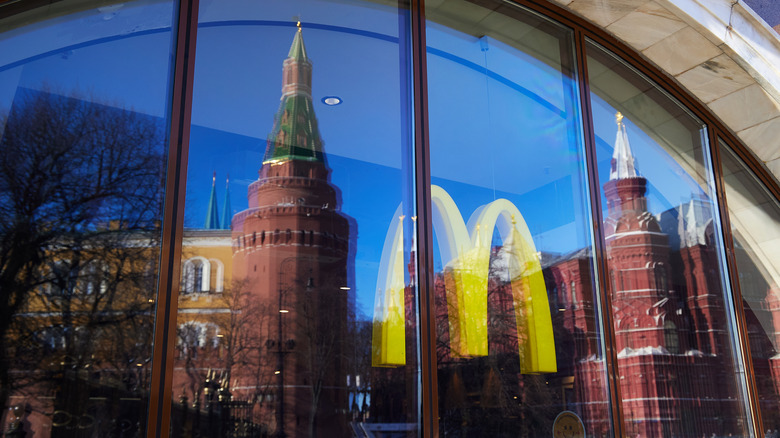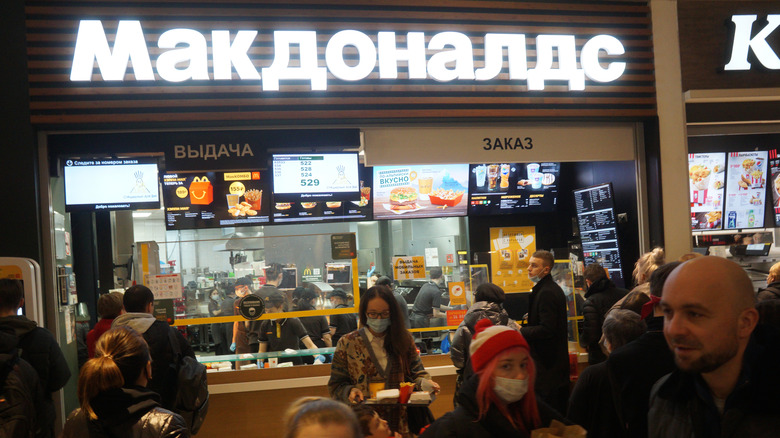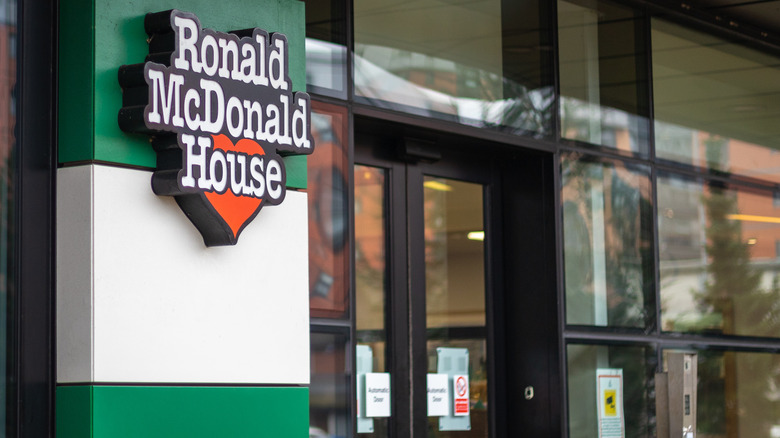Here's What Pausing Business In Russia Really Means For McDonald's
This week McDonald's joined the growing list of American and European companies suspending their business in Russia due to the country's ongoing and unprovoked war on Ukraine, which began on February 24.
The fast food giant made the announcement that it would temporarily shutter its 850 Russian stores after facing mounting pressure on social media to take action along with its soft drink supplier Coca-Cola and its rival, Pepsi. But while McDonald's has said it will suspend operation of the stores, which according to CNBC are almost all corporate-owned, the Chicago-based chain said it will continue to pay the approximately 62,000 Russian employees it has.
"[We] certainly don't take this decision lightly, but for us this is about doing what we think is the right thing to do, both for the global business and for our people locally," McDonald's CFO Kevin Ozan said in a statement at the UBS Global Consumer and Retail Conference.
The commitment to its Russian employees comes at a price though. CNBC reported that the closure is expected to cost the company, which made a profit of $7.5 billion dollars in 2021, according to the New York Times, an estimated $50 million per month. This roughly amounts to a loss of between 5 and 6 cents per share, which in the fourth quarter of 2021 were worth about $2.18 per share.
McDonald's is setting an example for other brands
The move to close McDonald's in Russia has a symbolic impact well beyond economics or inconvenience to consumers. As noted by the Washington Post, McDonald's was one of the first major western brands to begin operations in Russia in January 1990, just three months after the fall of the Berlin Wall. When the first of the company's stores opened in Moscow, it was met by a crowd of 30,000 people eager to try the notorious American burgers.
The chain is still popular in the region today, as the company's stores in Russia and Ukraine account for 9% of McDonald's global business revenue, which brought in about $2 billion in 2021.
Fast Company observed that not only is it a powerful move to see a brand which helped increase economic relations between the U.S. and Soviet Union shutting down its operations in Russia, it also sets an example for other brands. Hours after McDonald's made its announcement, ABC News reported that both Starbucks and Yum Brands, which operates KFC and Pizza Hut stores, announced they would also be temporarily shuttering their Russian stores.
While the details of Yum's move are still being finalized, Starbucks has followed McDonald's lead and also pledged to continue paying its Russian employees' salaries.
McDonald's is standing with Ukraine
While many people criticized McDonald's for being late to the game on its move to halt business in Russia, the brand emphasized in its official statement announcing the move that it had already taken action to support its Ukrainian partners last week. After the start of the war, the company quickly shuttered its 108 Ukrainian locations while continuing to pay their employees' salaries and pledging $5 million to its Employee Assistance Fund to support those directly impacted by the fighting.
Additionally, the company has contributed to relief efforts through the International Red Cross and Ronald McDonald House Charities, which announced the construction of its first facility in Kyiv in December 2021. And, with its Ronald McDonald House Charities, McDonald's has deployed mobile aid units to provide support to refugees at the Ukrainian borders with Poland and Latvia. The statement also noted that Ronald McDonald House personnel in Ukraine are working to provide aid to those remaining in the country and to medical workers.
While CEO Chris Kempczinski noted that "at this juncture, it's impossible to predict when we might be able to reopen our restaurants in Russia," he also reiterated that Ronald McDonald House Charities will continue normal operations within the country and that the brand "will be guided by our values and our purpose to feed and foster communities across the globe" as the conflict continues to unfold.


